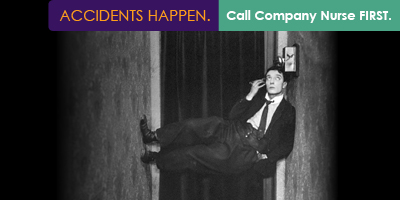By Debra Spamer, vice president of business development
Have you seen it yet? Accidents happen. Call Company Nurse First. It’s an important message that’s part of our company’s new look. A new look that better portrays the truth about workplace nurse triage and throws a little humor in, just for fun. Who doesn’t need a little of that?
Too often, workers’ comp can be anything but fun. I’ve seen first-hand why it’s so important for workers to immediately report their injuries. Between giving employees a straight-forward process to address their workplace injuries and providing employers with a way to manage these injuries, calling Company Nurse first lessens the pain of workers’ comp.
Let’s Get Some Direction
You’ve seen it. You may have even experienced it. A worker gets injured on the job and then everyone panics! What to do next? Who to alert? Who to call? Where to go? Injured workers usually don’t have a clue about what to do at the moment of injury. Even the smallest accidents trigger worry and confusion. These situations may even baffle supervisors. Many times, they send any injured worker to the emergency room, “just to be on the safe side.” Or even worse, they ignore the injury completely. Not good.
Both scenarios hurt your employees. There’s the hassle of sitting for hours in ER when self-care would have sufficed. On the other hand, ignore a serious injury and it could develop into something critical. Do you really want your employees making care decisions?
Contrast that with a call to Company Nurse. Injured workers talk with an experienced RN who assesses the situations and recommends the proper methods of care or, if needed, a medical facility. At last, clarity instead of crisis!
Confidence is the Key
Providing employees with 24/7/365 access to a registered nurse transfers the decision point from an unqualified supervisor to a licensed medical professional. That drives confidence all around. Anxiety and confusion are gone. And even though our triage nurses already have amazing experience, we equip them with clinical software algorithms. This means workers receive an even more reliable and systematic triage of workplace injuries.
The Price of Great
You might be thinking, “This sounds great. What does it cost? It has to be pricey. It must take a lot of time.” First of all, it is great. But no, it’s neither pricey nor time-consuming. In fact, not using workplace nurse triage is what can be pricey and time-consuming. Having a nurse as the first point of contact cuts down on time, minimizes expenses, and even lowers the incidences of litigation. Let’s look closer at how the savings work:
- Employees are incentivized to immediately report their injuries; there’s no gap in communication. (That’s good!)
- Nurses record the injury and send a report to each stakeholder. Right away, companies and providers become aware that an injury has occurred. (Even better!)
- Workers get superior care, faster and with improved outcomes. (Nice!)
- Employers can prepare for what might come next and plan for various outcomes. (That’s outstanding!)
- Day-of-injury reporting improves accuracy, minimizes paperwork, and makes your life easier. (I love easier!)
What if there’s no nurse triage? Well, it looks like this:
- Workers wait to report an injury and risk a small thing turning into a big thing. (That’s not good.)
- Employers have no control over initial treatment and it could be excessive. (That’s really not good.)
- Costly, unnecessary ER visits and lost hours. (Sounds expensive.)
- There’s little to no paperwork to back up an injury litigation claim. (Sounds really expensive.)
Can you afford that? Nurse triage isn’t pricey. No nurse triage is pricey. Accidents happen, so if you are ready to be prepared, if you want processes in place that protect you and your workers—they absolutely matter too—then, call Company Nurse first.

